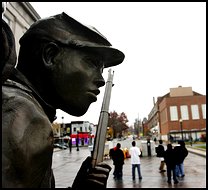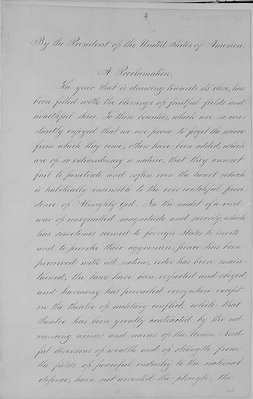 Today, President Lincoln is praised for liberating slaves by continuing an unpopular war contrary to the huge antiwar movement and open riots in the Union.
Today, President Lincoln is praised for liberating slaves by continuing an unpopular war contrary to the huge antiwar movement and open riots in the Union.Today, President Bush is accused of liberating enslaved Muslims throughout the world by continuing an unpopular war contrary to the huge antiwar movement and demonstrations in the Union.
Today, President Lincoln is praised for dismissing accusations of carrying a meaningless war and sacrificing thousands (600) of American lives for liberating people who were not even American citizens and were not even considered human by many in the Union.
Today, President Bush is hated for dismissing accusations of carrying a meaningless war and sacrificing thousands of American lives for liberating people who are not even American citizens.
Today, President Lincoln is praised for not reacting to accusations of carrying a war for tariffs and economy.
Today, President Bush is accused for not reacting to accusations of carrying a war for oil and economy.
Today, President Lincoln is praised for dismissing claims of being a social tyrant by violating the civil rights and arresting people and newspapermen considered traitorous to the Union cause in order to win the war and protect the Union.
Today, President Bush is accused for dismissing claims of being a social tyrant by violating the civil rights in order to win the war and protect the Union.
Today, President Lincoln is praised for his single-mindedness and determination to get into and complete the war at any cost when it was not even Constitutional for his government to infringe on the Confederate state rights to maintain and expand slavery.
Today, President Bush is accused of single-mindedness and determination to get into and complete the war considered by many as unconstitutional invasion.
Today, President Lincoln is praised for ignoring the most vicious media and public criticism of his policies and ignoring the accusations of his intellectual incapacity and incompetence.
Today, President Bush is accused for ignoring the most vicious media and public criticism of his policies and ignoring the accusations of his intellectual incapacity and incompetence.
Today, President Lincoln is praised for his unyielding faith in Divine Providence and for relying on Divine Guidance in everyday political and personal matters.
Today, President Bush is accused of his unyielding faith in Divine Providence and for relying on Divine Guidance in everyday political and personal matters.
Today, President Lincoln is praised for saying on 9/11 1858 that “Our defense is in the preservation of the spirit which prizes liberty as the heritage of all men, in all lands, every where.”
Today, President Bush is accused for materializing what Lincoln said.
WHY IS PRESIDENT BUSH HATED FOR WHAT PRESIDENT LINCOLN IS PRAISED FOR?
PS. These questions are some of the issues discusses in our movie "The Wounded Warrior".
Once again for all of those who have tried and still are trying to diminish the value of our work, I must state over and over that we are not comparing President Bush to President Lincoln in any individual way.
We simply indicate that there is a vivid parallel between their policies and presidencies and they way the situations were handled by both men.
President Bush continues the controversial legacy of Lincoln and finds himself in the same predicament that Lincoln found himself in as the war prolonged and the faith in the cause died in the hearts of many.
And as the endless debate about the war continues to annoy this country, the wall that everyone avoids to hit still has the following graffiti on it:
WHY IS PRESIDENT BUSH HATED FOR WHAT PRESIDENT LINCOLN IS PRAISED FOR?


